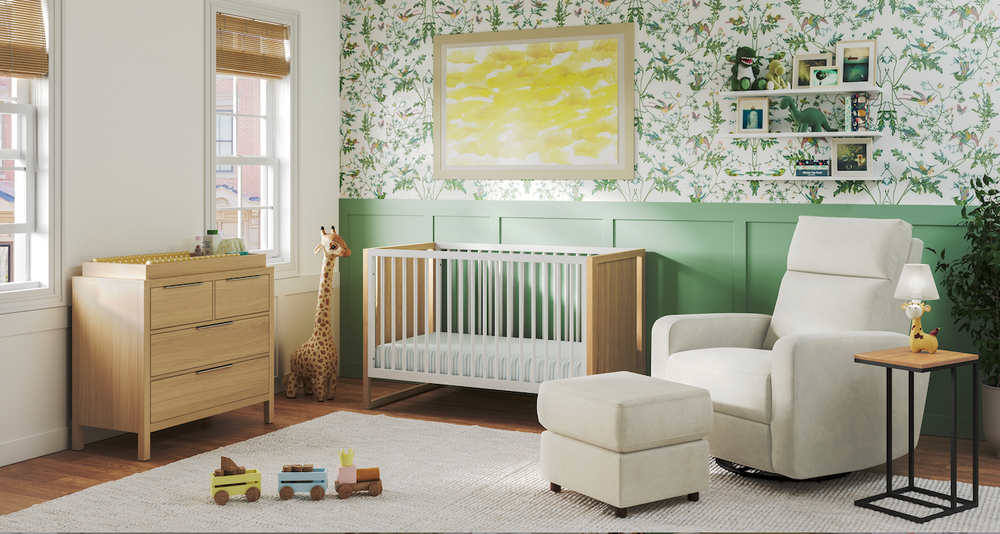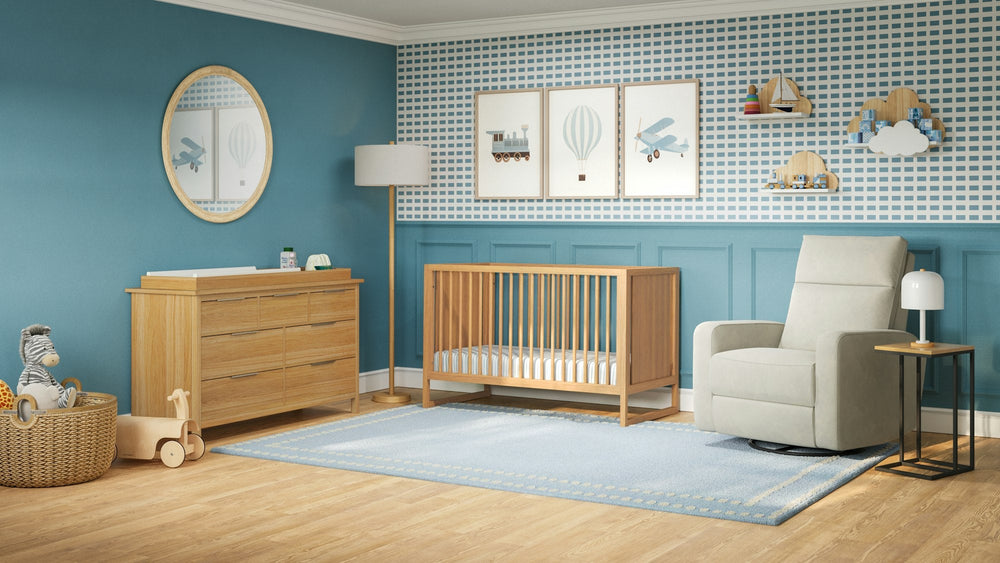
A baby checklist is a comprehensive list of everything you will want to complete before your baby’s arrival. The list includes essential items like a crib, mattress, and bulb syringe.
It will also include tasks to help ensure you and your baby are happy and healthy, before, during, and after the big day!
You might be wondering, “why do I need a baby checklist?”. Thinking about everything you have to buy and do to get ready for your baby’s arrival can feel overwhelming. Having a well thought-out list will help you prepare for the physical, financial, and emotional tasks surrounding pregnancy and birth.
Okay, now that you know you need one, your next question might be what to include in your baby checklist. Don’t worry! We’ve got you covered with the ultimate checklist to prepare for your birth plan, prenatal health, and one-time and routine purchases of baby essentials.
So, we know your next question is probably “when should I prepare my baby checklist?”Let’s start now! It is best to begin working on your checklist in the first trimester, so you have time to prepare for all the changes in store for your growing body, baby, and family.
But if you’re a procrastinator and quickly approaching game day, don’t worry—we’ve still got your covered. Nurture& is a great place to start investing in some of the most critical baby essentials, including nursery furniture, feeding accessories and crib sheets.
Physically Preparing for a Baby
The best way to prepare for the day your baby arrives is to care for your body. Pregnancy challenges the body and is hard work. You will need to be more aware than ever of the foods you’re eating, and whether they are safe for your growing baby.
Be sure to eat a well-rounded diet that contains enough protein, iron, calcium, folic acid, and vitamins. Your prenatal supplements will help you achieve your daily intake of these and other important nutrients that are needed for your little one to grow healthy and strong, so remember to take them as directed.

You will need to work closely with a healthcare provider throughout your pregnancy. Finding a provider who is in your insurance network will alleviate some financial stressors you may feel.
It is also important to choose a provider who shares your values and respects your birth plan. Whether you are looking to have a home birth, VBAC (Vaginal Birth After Cesarean), C-section, or hospital birth, find a provider that will fit your needs.
See below for the list of of providers that you can choose from.
Types of Providers You Can Choose from
Primary Care Physician
Many family medicine providers offer prenatal services to women with low-risk pregnancies. In most cases, when you choose to work with this type of provider, the plan will be to deliver at a hospital. When the new baby arrives, this doctor could also become your baby’s pediatrician.
OBGYN
An OBGYN (obstetrics and gynecology doctor) is the most common choice for expecting parents who want to deliver their baby in a hospital setting. You will see your OBGYN consistently throughout your pregnancy.
They may perform ultrasounds, bloodwork, urinalysis, and glucose testing in their office, or send you elsewhere for lab work. They specialize in women’s care before, during, and after pregnancy. OBGYN’s are also medical experts in the birthing process. They are able to assist in low to high-risk pregnancies.

Certified Midwife
A certified midwife specializes in pregnancy, childbirth, and postpartum care. They are typically less clinical in their approach than OBGYNs, and specialize in lower risk pregnancies. Midwives can deliver babies in hospitals or in home birth settings. After birth, the midwife will check on your little one and the new mom. They can offer breastfeeding support if desired.
Doula
A doula is someone who provides emotional and physical support to the expecting parents, and especially the mom-to-be, on a continuous basis throughout each stage of the pregnancy. Doulas may also offer postpartum care including infant feeding support, coping skills, and emotional support.
Doulas work alongside the new parents in whatever setting they choose for their birth plan. They are not medical professionals, but they receive training in emotional and physical labor support methods.
Where Can You Give Birth?
Choosing a healthcare provider will also determine which settings you can give birth in. Choose a provider who understands and accepts your birth plan.
Consider these options!:
Hospital
Delivering at a hospital allows you access to medical professionals who specialize in births and infant care. Some hospitals also staff specialists to assist in medical emergencies or TOLAC (Trials of Labor after Cesarean). They may also have a NICU for babies who need extra medical care after delivery, or those who are born prematurely. They can care for low to high-risk pregnancies.
If you choose an OBGYN as your provider, then you will most likely be giving birth at a hospital. Your OBGYN will have a specific hospital that they deliver at. You may need to register there beforehand with your due date, so they know approximately when you will be delivering, but this is not always protocol.
If you are concerned about pain management during labor, a hospital would provide you with the most options, including an epidural. The downside to this for some women is that they feel hospitals may lead to unnecessary medical interventions. If this goes against your birth plan, it may be something to consider when making your choice.

Birth Center
If you have a birth center in your area, you can consider delivering there if you are looking for a more natural birthing experience. The providers here are midwives, not OBGYNs. Birth centers are limited in their pain management options, and patients may need to be transferred to a hospital if complications arise. But one major benefit of a birth center is that they are less clinical than a hospital, and do not feel like a medical environment.
Water Birth
Water births typically occur during home births or at a birth center. These are when either labor, delivery, or both occur in a pool of water. Water is said to help naturally ease labor pains. Water may also shorten the time of labor if it is used during the active labor phase. A doula or midwife may assist with a water birth. This is ideal for women who have low-risk pregnancies and would prefer to have a natural, unmedicated birth.
Home Birth
A home birth is an ideal choice for women with low-risk pregnancies who want to avoid unnecessary medical interventions. A doula or midwife may assist in a home birth setting, and many women who give birth at home feel more relaxed and in control due to the familiar environment. The downside of a home birth is that you may need to be transferred to a medical facility if issues arise that are beyond the scope of a doula or midwife.
There are many options to consider as you physically prepare for the big day and your little one’s arrival. Consider carefully which options best suit your birth plan and will make you feel the most comfortable and confident as you deliver your bundle of joy.
For more information about preparing for your new baby, check out our Newborn Baby Guide.
Financially Preparing for a Baby
Preparing for a baby is also a big financial expense. Below are a list of expenses for you to consider and plan for:
Insurance and Health Checklist
- You will need health insurance to help cover the costs of your prenatal visits, as well as labor and delivery if you choose to deliver in a hospital.
- When the baby is born, they may automatically be covered under your insurance, depending on your state. Be sure to call and let them know when your baby arrives so that coverage may begin (and within the timeline provided). They typically request a copy of the birth certificate in order to add your little one to your insurance plan.
- Discuss with your doctor how they bill for your prenatal appointments. Some practices bill upfront for the cost, as you go, or at the end.
- Your insurance company can let you know what is covered or subject to a copay or your deductible. Call your benefits coordinator or advisor and check to see what your insurance covers. Ask if your insurance company needs to pre-approve any ultrasounds or additional bloodwork.
- Many insurance companies cover the cost of breast pumps. If you plan on using a breast pump to store breast milk for your baby, there are companies that work with your insurance company to provide you with a free new breast pump.
A baby shower is a great way to stock up on essentials and baby gear for your bundle of joy! You can make a baby registry on many sites like Amazon and share it with your friends and family before the big day. Some allow you to add items from any store. Make a list of things you need, and put as many baby items as you can find on it!

The baby essentials you will want to put on your list include one-time purchases as well as routine purchases. Here are some items you may want to consider:
Nursery Checklist (Bath Time, Feeding, Diapering)

One-Time Purchases
- Glider—here are some cozy options for furnishing your dream nursery: Nurture& Glider and Glider Plus.
- Crib—here’s a great modern one made from sustainable materials: Nurture& Crib.
- Mattress—here’s a nontoxic one with a washable cover: mattress on Nurture&.
- Bedding—here are some 100% cotton sheets in a soft blue hue: Nurture& crib sheets.
- Baby washcloths
- Baby hooded towels
- A bath support or seat
- Bath toys
- Cradle cap brush
- Diaper pail
- Burp cloths
- Baby bottles
- Baby bottle brush
- Bottle sanitizer/sterilizer
- Bottle drying rack
- Breast pump
- High chair
- Baby forks, spoons, bowls, cups
- Pacifiers—a variety to see which baby prefers.
- Bassinet
- Changing table
- Baby monitor
- First-aid kit
- Baby thermometer
- Bulb syringe
- Nail clippers
- Hairbrush
- Babyproofing supplies
Routine Purchases
- Baby shampoo
- Baby lotion
- Diapers. Lots and lots of diapers.
- Cloth diapers, if you would like to be more environmentally friendly.
- Same with wipes—a lot! Choose a reusable wipe, 100% cotton, or bamboo wipes for the most eco-friendly options.
- Diaper rash cream and skin protectant
- Diaper pail bags
- Formula
- Breast milk storage bags
- Sunscreen
- Laundry detergent—baby or free and clear.
Clothing Checklist
Let’s face it—babies grow faster than we are ready for. Be prepared for your baby’s arrival with clothing at least newborn-size to three months. You never know how big your baby will be until they arrive! Remember to pack multiple sizes of baby clothes in your hospital bag too.

Routine Purchases:
- Onesies
- Swaddles
- Sleep sacks, for when baby transitions out of swaddles around 3-4 months old.
- Pajamas
- Sleep and play outfits
- Socks
- Hats and/or bows
Out and About Checklist
Consider these purchases to make going out with your baby a little more convenient:
One-time Purchases
- Diaper bag
- Portable changing pad
- Stroller
- Car seat
- Travel system: carseat and stroller combo
- Sunshade for car windows
- Portable crib
- Baby carrier
- Snack cups.
Routine Purchases
- Cooler for baby bottles
- Ice packs for cooler
- Travel sized diaper cream
- Hand sanitizer
- Disposable diaper pail.
Once you’ve accounted for the essentials, consider allocating additional funds for a baby shower and/or perhaps a babymoon, to enjoy some alone time before life gets a little crazier. Here are some ways to host a cost-effective baby shower:
- Host it at home.
- Send digital invitations.
- Make simple games to play out of everyday materials.
Find here more information about the third trimester of pregnancy here.
Emotionally Preparing for a Baby
Pregnancy can make emotions run higher than usual. This starts in the first trimester with morning sickness, and continues through the postpartum period. Morning sickness can bring about negative emotions by the limitations it imposes. You may be able to do less than before your pregnancy, and this could lead to feelings of isolation.
Grief, mental health problems, and other stressors can be exacerbated by big life events—and pregnancy and parenting are two of the biggest! To be prepared, take these into consideration:
Self Care
While your body works hard to grow your little one, it will need more rest and care. Taking a warm bath, reading a book, or going for a walk outside are just some ways that might help you feel relaxed and recharged.

Establish a Support System
There is so much that goes into being a first time parent, but even seasoned parents need support and community. Surround yourself with family and friends, and let people know what you need. Set up a plan for when the baby arrives.
Ask your support system who can help care for pets or your other children. After you bring your baby home, you will still need support. Family and friends might be able to bring meals or help clean up around your home. Advocating for your needs will make you feel happier and healthier!
Childbirth Classes
Many hospitals offer childbirth classes, but you can also seek out classes by midwives or doulas in your community. Online courses have also become more popular.
Childbirth classes can cover not only the birthing process, but also how to care for your newborn, what to expect the first year, or navigating maternity leave. Whether you want to have a natural birth, a home birth, or a medicated birth, there is a childbirth class for you.
Seek Help from a Mental Health Provider
If you find yourself struggling with prenatal or postpartum anxiety or depression, finding a mental health professional to work with is the best thing you can do for you and your baby. Even if you just need someone to talk through the added stressors of pregnancy and new parenthood, it is a good idea to have a therapist or counselor on your team.
Talk to Your Primary Care Physician
Maintaining an open dialogue with your primary care physician can help you worry less and feel informed throughout your pregnancy. Discuss any concerns you may be having, and come up with solutions and plans together.
Preparing for a baby is a marathon. Getting started in the first trimester will allow you to make a plan and execute it over the following months, helping you better prepare physically, financially, and emotionally.
Don’t forget to prepare for delivery with a well-stocked hospital bag. Check out our to learn more about the essential items you don’t want to leave behind on the big day!
Visit our online store to discover more about the brand, and shop from an amazing selection of baby essentials while you’re at it, too!








